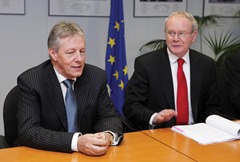Belfast v. Brussels
 John O’Farrell calls on the candidates to seriously debate the future of EU funding.
John O’Farrell calls on the candidates to seriously debate the future of EU funding.
Last month, the trade unions created a new initiative which called on the Northern Ireland Executive to “take a real risk for peace, progress and equality and honestly confront the consequences of political stalemate and its effect on our economy and society.”
The impetus for this came from members of trade unions who are as fed up with the permanent impasse in Stormont as other groups who have expressed their fears and frustrations – the churches, students and employers, not to add the ‘three godfathers’ of the peace process: the administrations on London, Dublin and Washington DC.
So far, the European Commission has held its diplomatic counsel but Brussels bureaucrats of my acquaintance are dismayed by a series of decisions and non-decisions which involve EU funding.
It is observed that the Northern Ireland Executive is keen to take the credit for many of the achievements realised by EU funding, but representatives of political parties routinely denounce Brussels “interference”.
Interference such as roads and broadband, rural development and subsidies for farmers, education for apprentices and young people not in education, training or employment and valuable work that some parties would find hard to defend were they totally dependent upon Stormont funding, such as the re-integration of prisoners and support for victims.
Political paralysis costs money. The A5 road project has so far cost £60 million and is going nowhere fast. The Maze-Long Kesh Development Centre has been stalled over its peace centre, leading to the loss of £18 million in EU funding. Further EU funding opportunities have been threatened or lost due to inter-Executive disputes over the Narrow Water Bridge (£14.5 million) and the unseemly spectacle of DFP and DARD fighting in the High Court over the Common Agricultural Policy fund, described by Lord Chief Justice Morgan as “a case about political failure.”
The next seven years of EU funding has largely been decided and while capital structural funding has faced about a 40 per cent cut, the Social Fund has survived with an emphasis on tackling youth unemployment and educational under-achievement. We need that help.
26,000 young people are unemployed. Just as disturbingly, thousands more of our brightest young people are leaving. Like the inward investment lost by political instability, we are losing what we never had, but desperately need.
‘Investment’ is usually seen as the UK taxpayer giving grants and tax breaks to multi-nationals to set up shop for a few years. Corporations are, in the end, the prime targets for, and main beneficiaries of, any major cut in corporation tax. There are other forms of FDI, however, and some of us would argue that the investments made by the European Commission and Parliament have been almost entirely beneficial to the vast majority of people living here.
But there is little or no political love for the EU among the likely victors in May’s European Parliament elections. Nor can we expect much debate upon issues affecting wider European polity, such as the Transatlantic Trade and Investment Partnership (TTIP) a trade deal currently being negotiated between the EU and US, which an excited David Cameron gushed as a “once in a generation prize.”
Trade unions in both the US and EU are very concerned about this, as it may include provision from existing international trade deals, such as allowing private investors to control the state’s ability to legislate in the public interest if the trade deal includes what is called ‘investor-state dispute settlement’ (ISDS) provision. ISDS allows investors to challenge state actions which they perceive as threatening to their investment.
Egypt has been sued by Veolia for raising the minimum wage, Germany is in court for abandoning nuclear power, and Canada has been challenged by US pharmaceutical giants for restricting the use of high price drugs.
There are no proposals to give consumers, environmentalists or workers the same protections. An ISDS provision in TTIP would create a sort of platinum class law court for the world’s frequent flyers.
I would like to see the candidates for the EuroParl discuss this. I want to hear Northern Ireland Executive ministers explain how their departments would be affected. But I think I know already the tenor and topics of the debates to





